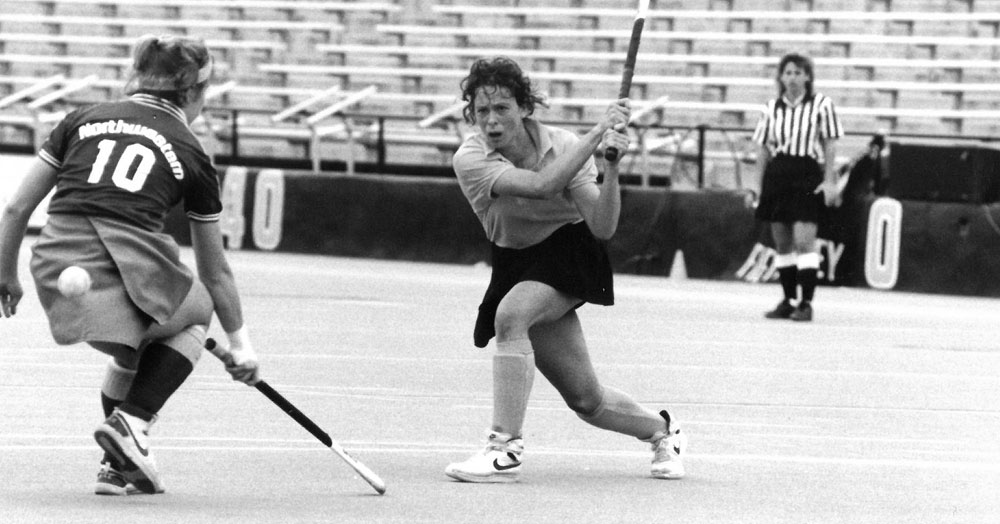Iowa Athletics Hall of Fame
Cherie Freddie (90BFA)
Cherie Freddie’s first memory of Iowa came when her plane was landing in Cedar Rapids.
Freddie, born in Hawaii and later raised in San Diego, hadn’t been to the Midwest. So when she looked out the window of the plane on its final approach… “I thought, ‘My god, we’re going to land in a cornfield,’” she says, laughing.
Freddie, then a junior in high school, was on her way to play field hockey in the Junior Olympics in Iowa City. Playing in Kinnick Stadium impressed her, but playing at Iowa wasn’t a thought.
When Iowa brought her in on a recruiting trip a few months later, Freddie got another Midwest experience.
“I had never seen snow come out of the sky; I’d never seen four seasons,” she says. “So what did they do? They recruited me in the middle of winter.
“And I said, ‘Yes.’”
And it turned out Freddie would be one of the biggest contributors to the success of Iowa’s field hockey program in the late 1980s.
Freddie was a member of the Iowa team that won the 1986 NCAA national championship, beginning a four-year run of Final Four appearances. She was also a part of three Big Ten championship teams.
Now she is being inducted into the UI Athletics Hall of Fame.
“I’m going to tell you, I was in shock,” Freddie says. “During the time you’re playing, you think at the end of it, ‘Well, that was nice. It was amazing while it lasted.’ And then one day you get a call saying, ‘Hey, you’re in the Hall of Fame.’ And you’re like, ‘What? Are you kidding?’”
Freddie was a two-time NFHCA first-team All-American and a three-time first-team All-Big Ten selection. She was named to the Big Ten’s All-Decade team after helping Iowa to a 74-15-5 record during her career.
“I’m grateful that we just had people around us that would not allow us to fail,” she says. “That crossed over to our whole mindset. We were pushed to our limits. I was pushed to limits that my mind never thought I could go.

PHOTO: HAWKEYESPORTS.COM
“It’s a part of my life every day, what we learned and what we did as a team through those years.”
Freddie played two seasons for coach Judith Davidson and two for coach Beth Beglin (92MA, 04JD).
“Judith recruited me, and I am grateful for that,” Freddie says. “And it was great getting a chance to play for Beth.”
Snow and cornfields aside, Freddie knew right away that Iowa would be her best choice.
“As soon as I got to Iowa and they showed me around, and they showed me where I was going to play, I thought that it felt like family,” she says. “I thought it just felt right.
“People thought I came from the Midwest. They still do. Maybe I should have been born in the Midwest."
Freddie appreciated being a part of the building of one of the top field hockey programs in the nation.
“Dr. (Christine) Grant, Judith Davidson, (assistant coach) Michele Madison, they were not settling,” says Freddie, now a high school arts teacher in Oceanside, California. “They didn’t settle for anything. It was, ‘This is what we expect.’ Not just in our play, but in the resources, how money was spent. They made us feel like we were equal.
“I thought I hit the lottery going to the school.”
—JOHN BOHNENKAMP
